A low FODMAP diet has been known to improve and reduce the symptoms of irritable bowel syndrome (IBS). Because of that, many people choose to eliminate FODMAPs from their diets to feel better.
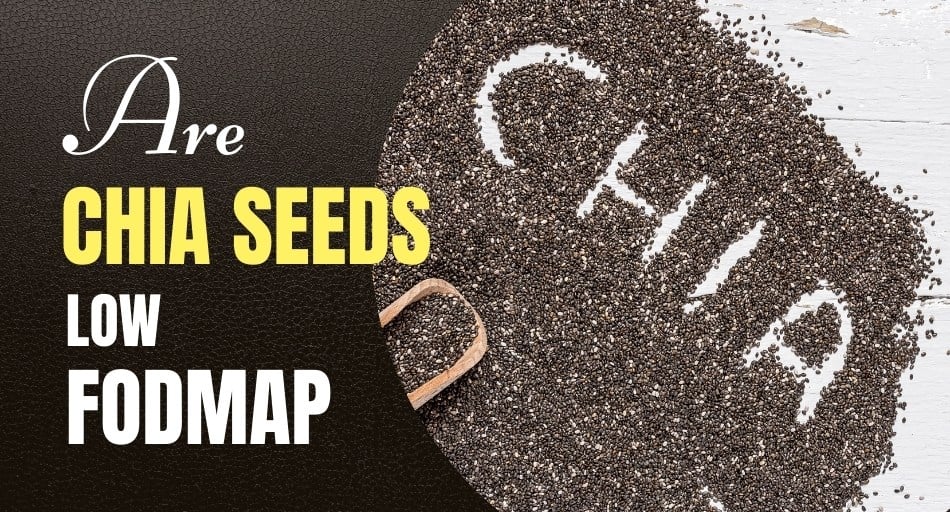
Unfortunately, a lot of foods contain these indigestible carbs. So, it’s very important to be aware of which foods you can have on a low FODMAP diet.
If you enjoy smoothies and include chia seeds in them, you might be wondering if these small seeds are bad for IBS. So, are chia seeds high in FODMAPs?
Table of Contents
Are Chia Seeds Low FODMAP?
Chia seeds are allowed on a low FODMAP diet as long as they’re consumed in moderation. A small serving of chia seeds is not only safe for people with IBS but also for those with other digestive system issues.
What’s more, chia seeds are rich in various nutrients like fiber and various minerals that contribute to good health.
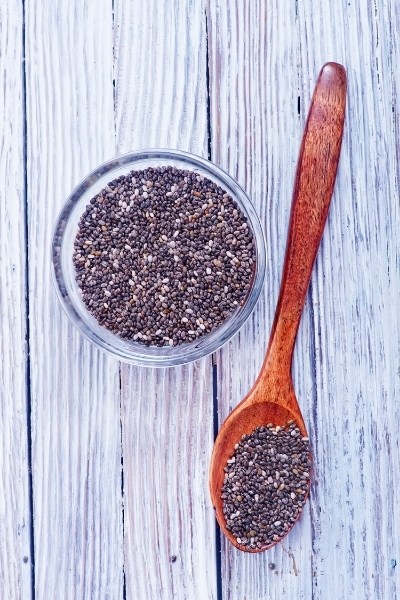
So, it’s a good idea to incorporate some chia seeds into a healthy, balanced diet.
How low in FODMAPs are chia seeds?
Generally, most people with IBS should be able to tolerate small servings of chia seeds. Experts recommend sticking to a serving of two tablespoons (28 g) in one sitting to avoid IBS-related symptoms.
A larger serving of chia seeds contains a lot more FODMAPs, so it should be avoided, especially on a diet particularly low in these indigestible, fermentable carbs.
But always listen to your body and adjust your diet accordingly if you notice that your IBS symptoms are getting worse.
On the other hand, some people claim that chia seeds, as well as other seeds, trigger some IBS symptoms and make them worse.
So, it’s best to add chia seeds to your diet slowly and check if you notice any symptoms over the next couple of days.
Can you eat chia seeds on a low FODMAP diet?
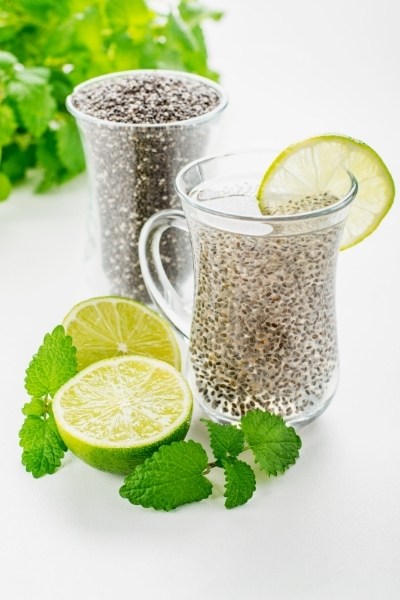
As long as you stick to small serving sizes, you can safely eat chia seeds on a low FODMAP diet.
A tablespoon or two of dried chia seeds is a safe serving for most people, even for those on a strict low FODMAP diet.
Chia seeds are also high in fiber, which is a good type of carb. Adding more fiber-rich foods to your diet can greatly benefit everyone with digestive system issues, including IBS.
So, keep that in mind when planning your next meal.
Does presoaking chia seeds make them lower in FODMAPs?
Generally, there’s no need to presoak chia seeds before eating them. This is because chia seeds are low in FODMAPs on their own, and they’re usually served with yogurt or other liquid.
So, the FODMAP content is very low.
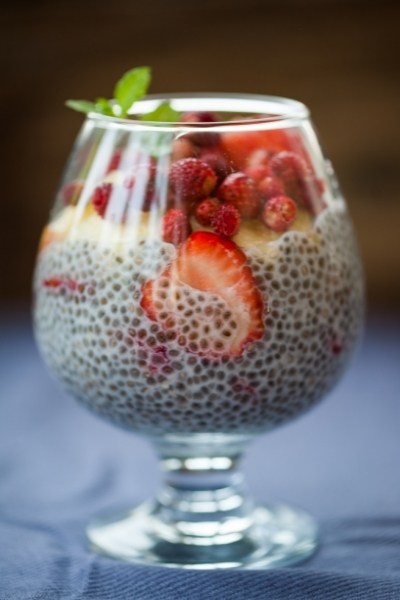
With that being said, some people still presoak their chia seeds, though. So, if you notice that chia seeds worsen your IBS symptoms, you can try presoaking them. That way, you may be able to avoid any unpleasant symptoms.
Are chia seeds good for you?
Chia seeds are incredibly nutritious, providing you with calories from all three macronutrients: carbs, fats, and proteins.
In fact, a serving of two tablespoons of chia seeds contains 42% of your daily recommended need for fiber.
This type of carb is very important for the health of your digestive system. It feeds the ‘good’ gut bacteria in your stomach and soaks up excess stomach acid. So, you’re less likely to suffer from digestive issues.
The same serving of chia seeds also provides you with 30% of your daily recommended need for manganese. This mineral helps your body form connective tissue, blood-clotting factors, bones, and sex hormones.
Getting enough manganese also ensures that your nerves and brain function normally. So, make sure to consume manganese-rich foods each day.
Chia seeds are also an excellent source of phosphorus. This micronutrient is crucial for building strong teeth, reducing muscle pain after exercising, and filtering out waste in your kidneys.
Phosphorus also helps your body produce DNA and RNA, which are your body’s genetic building blocks.
This mineral is most commonly found in poultry. So, if you’re following a plant-based diet, eating chia seeds can help you avoid phosphorus deficiency.
Other minerals that chia seeds are rich in include calcium, zinc, copper, and some potassium.
So, since mineral deficiencies are quite common these days, eating mineral-rich foods like chia seeds is a good idea.
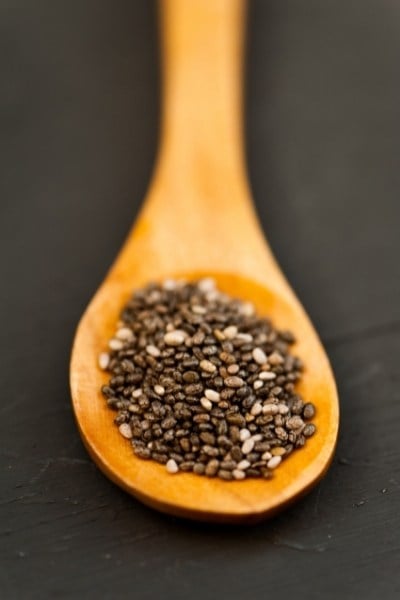
In addition to micronutrients, studies show that chia seeds have many other health benefits. For example, various research indicates that eating chia seeds can help you stay fuller after eating, contributing to healthy weight loss.
Experts also believe that the omega-3 fatty acids that chia seeds contain can protect your heart against damage, reducing your risk of various cardiovascular conditions like heart attacks and strokes.
What’s more, chia seeds are a great source of antioxidants. These plant compounds help flush out free radicals from your body, reducing your risk of oxidative stress and damage to your cells.
So, if you consume a lot of antioxidant-rich foods, you’re less likely to suffer from various chronic conditions, including heart disease, diabetes, and even cancer.
The antioxidants found in chia seeds also help prevent early aging, lower your blood pressure, and protect your liver and heart against damage and inflammation.
Eating chia seeds has also been found to lower your blood sugar levels. Because of that, chia seeds might prevent type 2 diabetes and help treat the symptoms if you suffer from the condition.
Chia seeds also have a low glycemic index (GI), which means that they don’t cause spikes in your blood sugar levels.
So, including chia seeds in your diet is incredibly beneficial, even in small quantities.
Conclusion
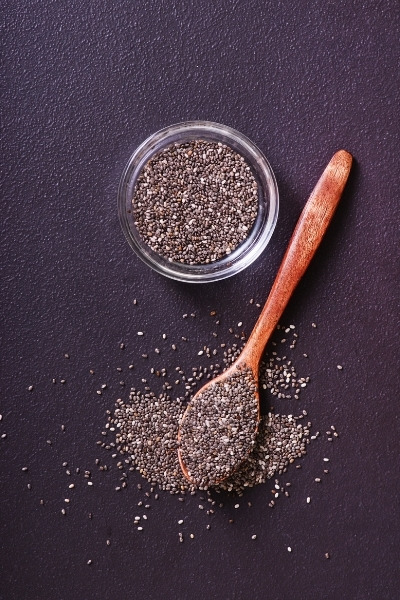
In small servings, chia seeds can be a great addition to a low FODMAP, IBS-friendly diet. But make sure to measure the portion sizes carefully, as it’s easy to overdo it on foods like chia seeds.
Aside from their FODMAP content, chia seeds provide you with an abundance of various nutrients, such as fiber, calcium, phosphorus, and manganese. So, eating them can greatly benefit your health.
Sources: Nutrition Data, Monash University, PMC, Research Gate, and National Library of Medicine
